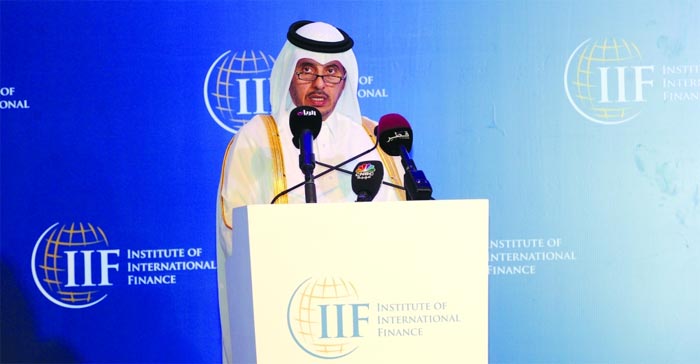HE the Prime Minister and Interior Minister Sheikh Abdullah bin Nasser bin Khalifa al-Thani addressing the meeting.
By Santhosh V. Perumal
Business Reporter
Qatar has large reserves to withstand the current trough in oil prices and its planned $200bn infrastructure spending will continue to spruce up the economy, which is expected to grow 7% this year, HE the Prime Minister and Interior Minister Sheikh Abdullah bin Nasser bin Khalifa al-Thani said on Sunday.
“We reiterate our commitment to investment in infrastructure, health and education,” HE Sheikh Abdullah told the Institute of International Finance (IIF) Spring membership meeting which is taking place in the Middle East for the first time.
"The public spending is in line with the Qatar National Vision 2030, which stands on four pillars of economic, social, human development and environment," he said.
Highlighting that a total of more than $200bn expenditure is planned for the next seven years, Sheikh Abdullah said Qatar was going steadfast with diversification as part of sustainable development in the country whose economy is expected to grow 7% this year from an estimated 6% in 2014.
Highlighting the various initiatives taken by the government to support the non-hydrocarbon sector, which grew 12% in 2014 (faster than the hydrocarbons) and expected to continue to do so in the coming years, Sheikh Abdullah said the new economic zones that were recently announced would cater to the small and medium enterprises, "whose importance to the national economy is on the rise".
Efforts had also been made to create conducive environment for attracting foreign direct investments, he said, adding Qatar had also been improving its profile in the global markets as an investor.
“We also reiterate our commitment to international investment as it will benefit our future generation,” the premier said.
HE the Finance Minister Ali Shareef al-Emadi said Qatar had enough reserves to withstand the current weak world oil price scenario.
Qatar Central Bank’s foreign currency reserves are more than $40bn and the sovereign wealth fund, Qatar Investment Authority, is reported to have about $160bn surplus.
Many economic think tanks have said ample reserves, which have been built during the peak of oil prices, provided “cushioning” effect for Qatar’s economic growth prospects and appurtenant capital expenditure for infrastructure as a run-up to the 2022 FIFA World Cup.
“Qatar has mega projects for the next 10 years,” despite low oil prices, al-Emadi said, asking the private sector to take advantage of the growing opportunities being brought about by the robust public spending.
This strategy would help in diversifying the economy, he said, adding that the emphasis was on research and development, education and health sectors.
The finance minister said the non-oil sector, which grew 12% in 2014, at present constituted more than half of the country’s gross domestic product.
QNB CEO Ali Ahmed al-Kuwari had earlier said the country’s non-hydrocarbon sector to be the growth engine and its share was expected to go up to about 69% by 2017.
Highlighting some of the changes that Qatar had undertaken recently, al-Emadi also said the budget year had been changed from April-March to calendar year, starting from 2016.

